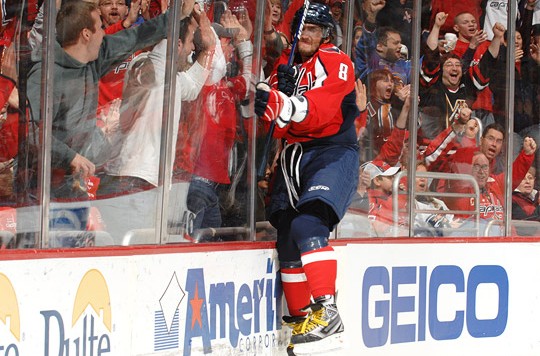And the fans rocking the red, the sirens bursting ahead
Gave proof thro’ the night that Ovechkin was widespread
O say, does that Russian brown bear yet roar
O’er the cold of the ice with the power of Thor
This partial adaptation of Francis Scott Key’s poem Defense of Fort McHenry could’ve been something that was published in Washington D.C. during the first few years of Alexander Ovechkin’s career with the Washington Capitals. The Moscow native burst onto the NHL scene during the 2005-2006 season with reckless abandon. In his first full season, he scored 52 goals, tallied 106 points, and easily made jaw dropping highlights night after night. He continued this rapid pace for the next four seasons, notching 217 goals and 423 points in only 315 games. With his skill and exuberant energy, Ovechkin gave the hockey world a taste of what raw power actually looked like. His presence on the ice not only forced his competition to raise their level of intensity, but also struck fear in the hearts of opposing fans all across the world. In one giant swoop, this hockey player became the pride of a country and the symbol of hatred for those who despised his toothy grin and cheeky celebrations.
As the 2010-2011 campaign began, many expected the gaudy numbers to continue. Instead, Ovechkin had an “off” year by his own standards – only snaring 32 goals and 85 points in 79 games played. Any levelheaded analyst brushed off the year, citing that anyone can have a bad year and in hindsight, Ovechkin’s 09-10 season was still impressive against the field. He placed himself 7th overall in the points standings and was able to help his team qualify for the postseason yet again. All was seemingly well in the land of the Alexander Ovechkin and the Washington Capitals. He was still the face of the franchise, the captain of his team, and the star player in the United States’ most important city.
After bowing out in the second round of the 2010-2011 NHL playoffs, Capitals general manager George McPhee rallied the troops and put together one of the most impressive off-seasons known to man – strengthening the roster from top to bottom while fetching top returns for players who weren’t in his long term plans. The team entered the 2011-2012 season with enormous amounts of pressure. They avoided any early broadside attacks from the media by winning their first seven games. At the time that this piece was written, the Capitals sit in 6th place of the Eastern Conference with thirteen games under their belt. All arrows point toward a successful season for Washington. But something just doesn’t seem right.
Enter the stat sheet.
Through thirteen games played this year, it looks like Alexander Ovechkin is on the same pace to repeat his performance from the 2010-2011 season. He currently has 6 goals and 13 points – which makes him a point per game player. In the grand scheme of things, those numbers are very good. However, this is Ovechkin we’re talking about. If we compare those numbers on his level, we’ll see that production is below the normal standard. Also, if we add the video highlights of his first six goals this year, we’ll notice the stats are not the only thing that is below the normal standard.
Gone are the days of his electric spirit engulfing the other eleven players on the ice. Gone are the days where his celebrations alone are highlight worthy. The youthful smile and bottomless pit of energy has escaped him. Nowadays, we see a more calm and composed Alexander Ovechkin. An unstoppable force of a player has been reduced to just another All-Star caliber player. The difference between the two types of players in this nit-picking analysis is very clear. Alexander Ovechkin no longer has his mental edge.
Alex isn’t the first dominant athlete to lose his mental edge. In 2009, the world witnessed the collapse of golf’s best player due to some poor personal decisions. The moment in which Tiger Woods destroyed his personal life is the moment he shattered his mental dominance. Even after the dust settled, Woods couldn’t return to form. It wasn’t because he was physically out of shape or because he no longer had the will to play. It was because the crisis he experienced damaged his thoughts permanently. Tiger Woods will never be the #1 ranked golfer again. Fortunately for hockey fans, the Ovechkin situation is different.
I don’t believe that Alexander Ovechkin is making poor personal decisions away from the ice. Nor do I believe that he has lost his mental edge for good. But I do wonder how he lost it. Is it because he has lost a loved one? Is it because the pressure is slowly getting to him? Or have we finally seen Alex Ovechkin mature has a human being and a hockey player? Whatever the case may be, it is his best interest and the Washington Capitals best interest to revert to the player he once was. His unique ability to make things greater than they actually are is what makes Alex, Alex. It is that same mental ability that can suffocate any opposition and power the Verizon Center to new levels of animation.
I think we can all acknowledge that his explosive style of hockey won’t last forever. There are only so many years where you can play as if you’re driving an eighteen-wheeler straight into a gas station. Eventually, father time will slowly break down Alex’s body into a cold pile of jello. But before we get to that point, will we ever see the mental edge return to Ovechkin’s game? Or is it gone for good? Can he transform the same power and bring it to the second stage of his career?

